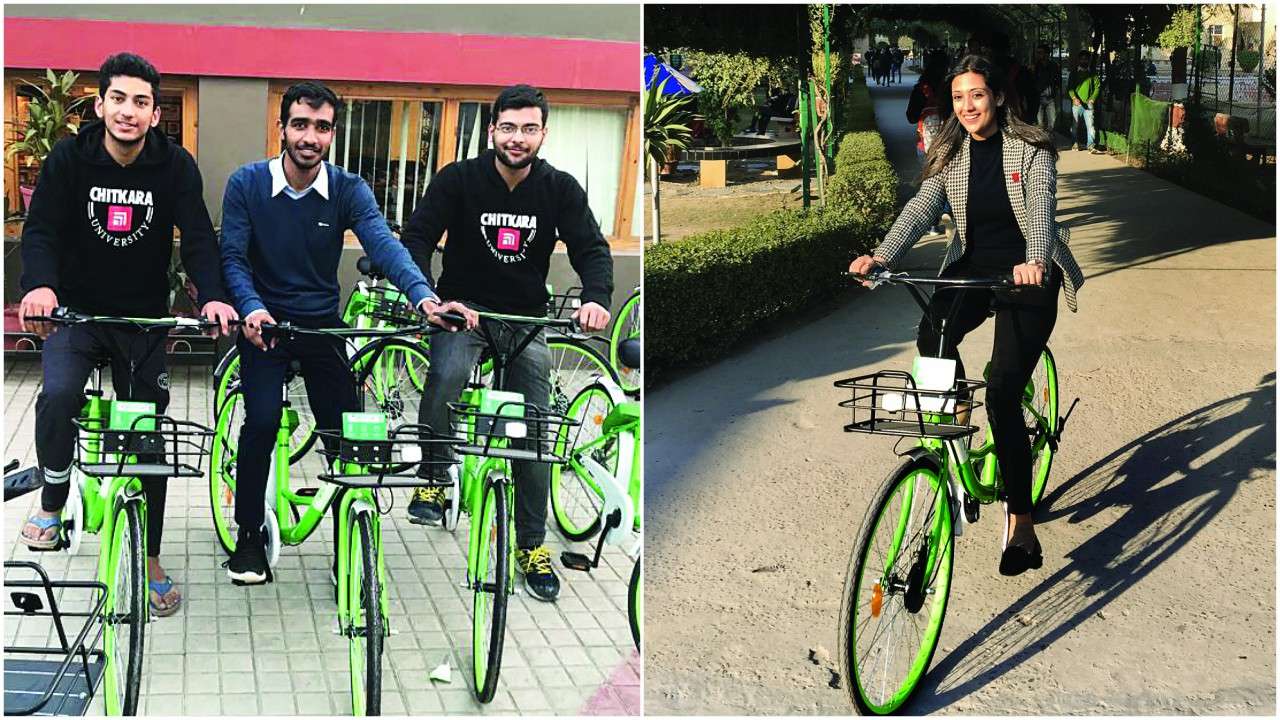
We never thought Ola/Uber would become an integral part of our lives, but they did, even though they are more expensive than other modes of transport, sometimes including regular taxis. The convenience of getting a taxi at your doorstep, any time of day, has converted most.
Will dockless cycles be the next gamechanger?
The Indian market has seen several recent entrants in this domain – Yulu, Mobycy, Ola Pedal, Zoomcar’s PEDL and ofo being the latest. All these companies have two things in common – a) they offer dockless service, which means you needn’t pick up the cycle and drop it back at the original centre, but can park it any designated location. And b) the service is offered through apps that help locate the nearest bicycle, unlock it via scanning a code, and pay through e-wallets.
While some of these operators are at the pilot stage and offer their services within a closed area like a university campus or tech park, others operate in larger spaces like a city.It takes Amit Gupta about 12 minutes to reach home from his office on cycle in Bengaluru’s Bellandur neighbourhood. “It’s been about a month since I started using the service,” says Gupta. “So when I took the car one of these days, I ended up cursing myself.”
He has been riding the 16 kg, solar-powered, sky-blue hybrid bicycle designed by his company Yulu, which has been operational in Bengaluru since mid January. By month end, Yulu plans to roll out in Pune as well. The company is targeting employees who live in 3-4 km radius of tech parks – commuters who’d otherwise rely on cab-hailing apps or drive their own vehicles to work. “The idea is to decongest the city,” says co-founder and CEO Gupta, adding that “a dockless bicycle service is a sustainable and shareable approach to urban transportation.”
Bringing a similar change in north India on a slightly bigger scale is Mobycy, which currently operates in Noida, Faridabad, Gurugram and Chandigarh, and plans to be in Jaipur, Pune and Kota by month end. They have about 2,000 cycles, of which 500 are already on the street.
“In Gurugram, our biggest market, we have about 300-350 cycles placed at 15 sites including Sector 44, Huda City Centre, Sikandarpur and Golf Course Road,” says Mobycy co-founder Akash Gupta, who launched the service in December with his wife Rashi Agarwal.
“Initially we were sceptical about whether people would want to change their travelling habits and ride a cycle, but within a month of inception, we realised we’ll have to put more cycles on the street to serve the demand. We crossed 8,000 rides last week,” says Gupta. Mobycy customers usually take their cycles for last-mile connectivity, either from a public space to office/home or to a nearby market.
Kundan Kumar Ray, 23, works with a consulting firm in Gurugram, where several employees have been using Mobycy bikes to commute to and from the metro station and office as well as home, if they live nearby. “I have been using it for 10 days to go to the metro after office. The best thing is that I don’t have to search a lot, they are usually available nearby and it only costs me `5 whereas for auto, I was paying `40. I also feel that I am exercising in a way and it helps me stay healthy,” shares Ray. He feels that people are a bit reckless with parking the cycles, but believes that it’ll improve with time.
This is not the only challenge to such services that operate without human interface – stealing or intentionally damaging the vehicle are also very real fears. “We have realised that there’s a level of curiosity among people in the initial days, leading to such things, but soon they grow tired of it and the problem gets solved automatically. We’ve seen this across the 25 countries we are operating in,” says Rajarshi Sahai, Director of Public Policy and Communications, ofo India. There is also a level of monitoring, he adds, by people deployed in every city to manage the cycles and services. "In case of an accident, there is a provision in the app to inform the team," adds Sahai. ofo is currently offering its services in gated communities such as the Pune University campus, and some residential societies in Indore.
Another challenge is the extreme weather conditions in India, since bicycles don’t shelter riders from the elements as cabs do. The bicycle service providers are aware of this problem and consider it a part of their business. “It will definitely affect our business and we are expecting an attrition rate of 20-30 percent. To minimise its effect, we launched our service in December. We are expecting that riding a cycle will become a habit, so when summer comes, people will continue using it at least in the morning and evening when it’s relatively pleasant,” says Gupta. But will it be the next Uber/Ola?
Bicyles are certainly one of the solutions to Bengaluru’s notorious traffic feels Amit Gupta who returned there in late 2016 after spending two years in San Francisco. He realised that the increased number of vehicles on the road and the crumbling infrastructure resulted in him spending 30 minutes to cover three kilometres, a distance that earlier took him only a few minutes.
“And it’s the same across the city, be it in Koramangala or Indiranagar,” he rues. “Commuters spend an hour or two on the road to reach their home/workplace.” He also believes that this traffic will act as a key ingredient in motivating people to change habits and alter behaviour. “The average waiting time for cabs on ride-sharing apps during peak hours is 20 minutes. This means you either wait for 20 minutes and eventually navigate traffic or pedal the short distance and reach home in as much time.” Will it be as simple as that?